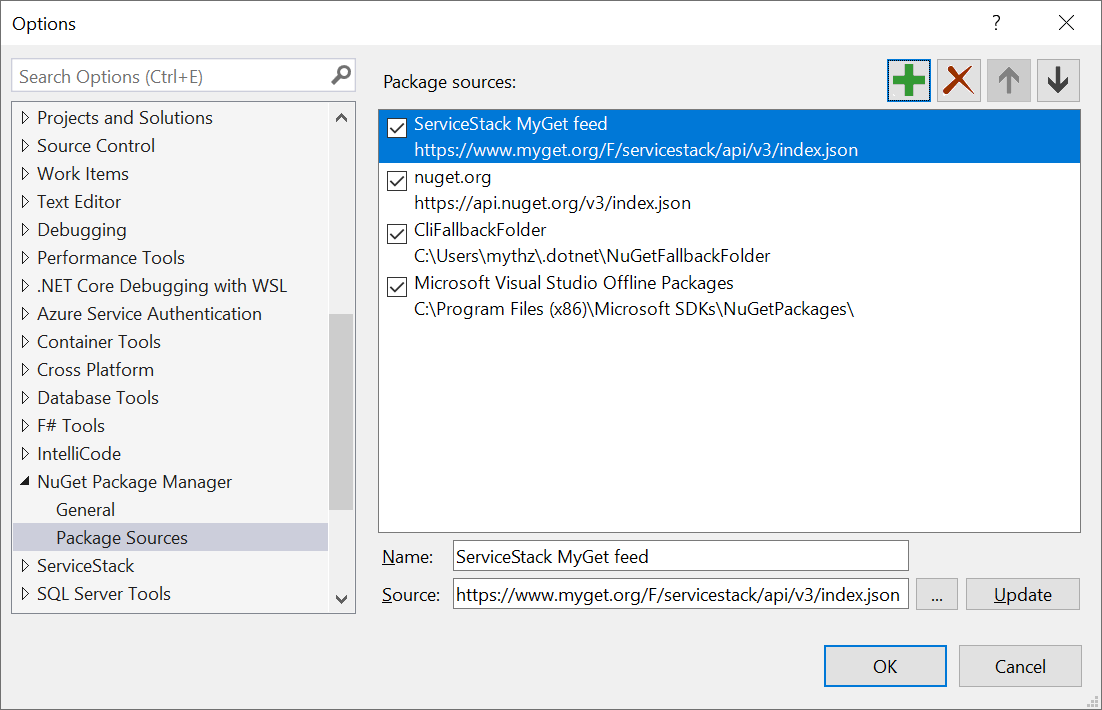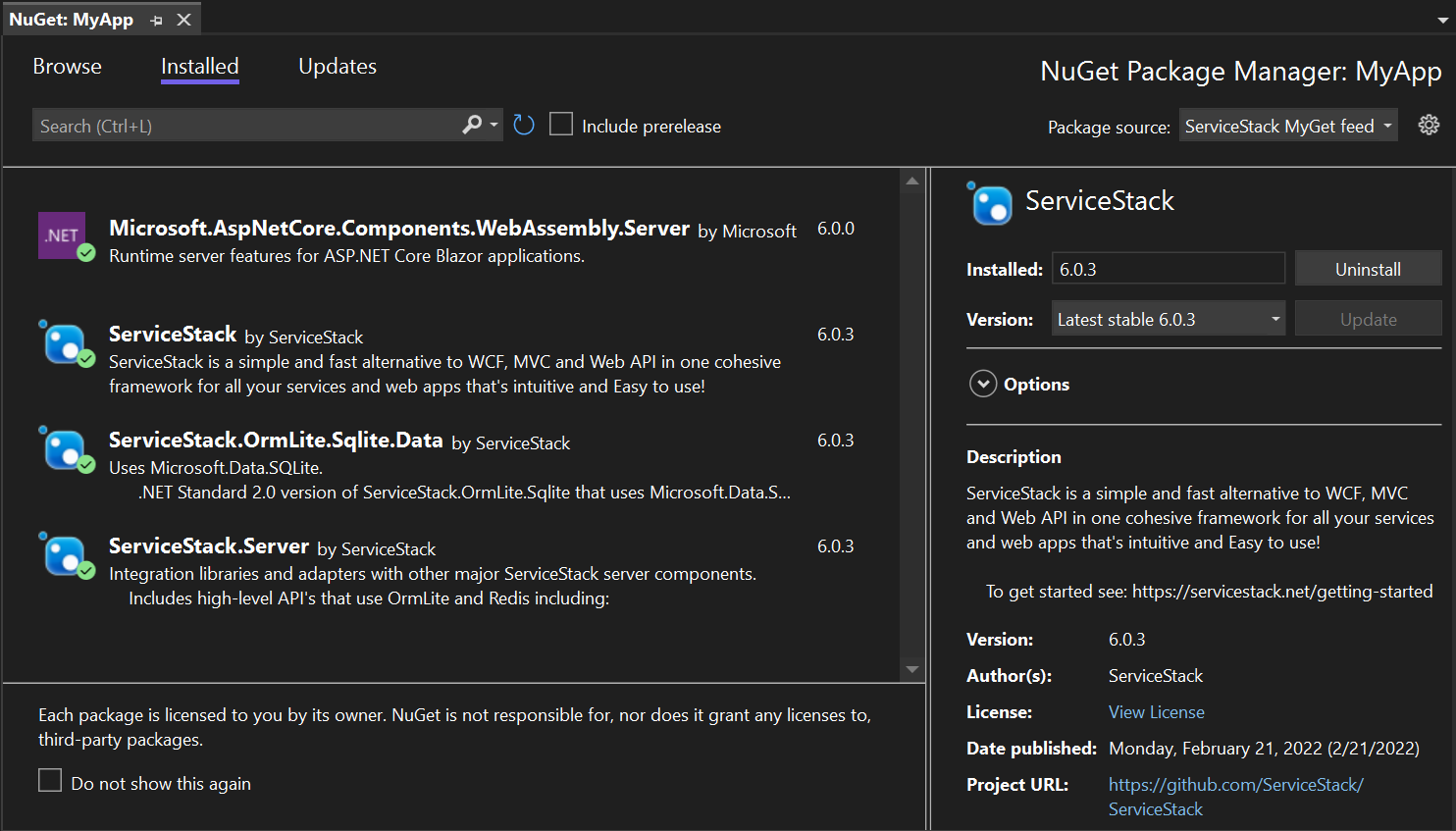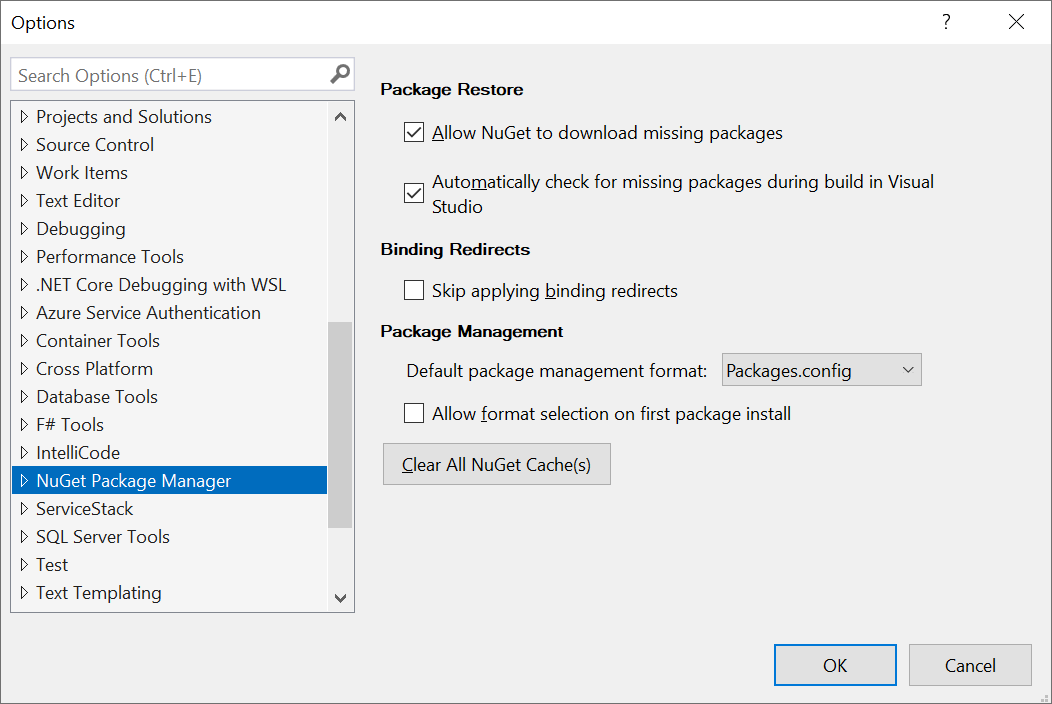ServiceStack pre-release MyGet Feed
Our interim pre-release NuGet packages in between major releases on NuGet are published to MyGet.
TIP
If preferred, the pre-release packages are also available in our feedz.io or GitHub Packages Registry.
Add using Mix
If you have the dotnet x tool installed, you can configure your projects by downloading NuGet.Config in the same folder as your .sln
npx add-in myget
Add using VS .NET
Instructions to add ServiceStack's MyGet feed to VS .NET are:
- Go to Tools > Options > Nuget Package Manager > Package Sources
- Add the Source
https://www.myget.org/F/servicestackwith the name of your choice, e.g. ServiceStack MyGet feed

After registering the MyGet feed it will show up under NuGet package sources when opening the NuGet package manager dialog:

Which will allow you to search and install pre-release packages from the selected MyGet feed.
Adding MyGet feed without VS .NET
If you're not using or don't have VS .NET installed, you can add the MyGet feed to your NuGet.config at %AppData%\NuGet\NuGet.config:
<?xml version="1.0" encoding="utf-8"?>
<configuration>
<packageSources>
<add key="ServiceStack MyGet feed" value="https://www.myget.org/F/servicestack" />
<add key="nuget.org" value="https://api.nuget.org/v3/index.json" protocolVersion="3" />
</packageSources>
</configuration>
Redownloading MyGet packages
If you've already packages with the same version number from MyGet previously installed, you will
need to manually delete the NuGet /packages folder for NuGet to pull down the latest packages.
Clear NuGet Package Cache
You can clear your local NuGet packages cache in any OS by running the command-line below in your favorite Terminal:
nuget locals all -clear
If nuget is not in your Systems PATH, it can also be invoked from the dotnet tool:
dotnet nuget locals all --clear
Within VS .NET you can clear them from Tools > Options > Nuget Package Manager and click Clear All NuGet Cache(s):

Alternatively on Windows you can delete the Cached NuGet packages manually with:
del %LOCALAPPDATA%\NuGet\Cache*.nupkg /q
Full Package Clean
In most cases clearing the NuGet packages cache will suffice, sometimes you'll also need to manually delete other local packages caches
delete all NuGet packages in /packages folder:
rd /q /s packages
delete /bin and /obj folders in host project
rd /q /s bin obj
Versioning Scheme
All ServiceStack packages are published together in "lockstep" with the same version number so the effort to upgrade ServiceStack projects can be done all at same time, with low frequency.
ServiceStack Versions adopt the following 3-part versioning scheme:
{MAJOR}.{MINOR}.{PATCH}
Major versions
The {MAJOR} is reserved for Major releases like v5 containing structural changes that may require changes to external environment and/or project configurations and support for different .NET Runtimes:
v5.*- Support for .NET 5.0 and .NET Framework v4.5v6.*- Support for .NET 6.0 and .NET Framework v4.7.2v8.*- Support for .NET 8.0 and .NET Framework v4.7.2v10.*- Support for .NET 10.0 and .NET Framework v4.7.2
Minor versions
The {MINOR} version is used for major ServiceStack official releases which will have a {PATCH} version of 0.
Patch versions
The {PATCH} version is used to distinguish updates from normal releases where a {PATCH} above 0 indicates an Enhancement Release.
Whilst we want to minimize the effort for Customers to upgrade we also want to make any fixes or enhancements to the previous release available sooner as there are often fixes reported and resolved immediately after each release and made available in our pre-release NuGet packages feed that most Customers wont get until the next major Release on NuGet.
To deliver updates sooner we dedicate time immediately after each release to resolving issues and adding enhancements to existing features so we can publish update releases before starting work on new major features. Update releases will be primarily additive and minimally disruptive so they're safe to upgrade.
- An even
{PATCH}version number indicates an "Update" release published to NuGet. - An odd version number indicates a "pre-release" version that's only available on Feedz.io or GitHub Packages
Versioning scheme example:
- v5.0.0 - Current Major Release with structural changes
- v5.0.2 - Enhancement of Major v5.0.0 Release
- v5.0.3 - Pre-release packages published to MyGet only
- v5.0.4? - Enhancement of Major v5.0.0 Release (if any)
- v5.1.0 - Next Major Release
- v5.1.1 - Pre-release packages published to MyGet only
- v5.1.2? - Enhancement of Major v5.1.0 Release (if any)
- ...
- v6.0.0 - Next Major Release with structural changes